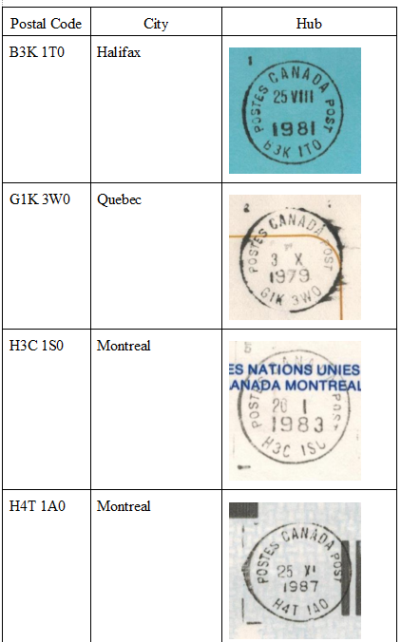When first introduced, the loss of city identifiers in postmarks was unpopular among postal historians. Peter Wiedemann of the Postal History Society of Ontario, an early critic of the nameless postal code postmarks, called them "idiot cancels". Today, almost forty years later, about two dozen processing plants handle most of Canada's mail and use postal code cancellations to postmark letters.
This article is organized as follows:
1. Pitney-Bowes Cancellers
2. Toshiba Cancellers
a) "Postes Canada Post" and Postal Code3. Klussendorf Canceller
b) "CANADA" and Postal Code
4. International Peripheral System Cancellers
a) "Postes Canada Post" and Postal Code5. Pitney-Bowes, Toshiba and I.P.S. Hub diameters
b) "CANADA" and Postal Code
6. Toshiba and Ink Jet Spray Cancels applied in Sequence
1. Pitney-Bowes Cancellers
The first Postal Code cancellations to appear were those used on Pitney-Bowes cancellation machines.The hub reads "POSTES CANADA POST" at the top of the circle with the postal code of the mail facility at the bottom of the circle. Hubs are 22 mm in diameter.
L2E 2L0
Niagara Falls
The seven-wavy line obliterators were only used on the Pitney-Bowes cancellers.
L73 2H0
Burlington

M1P 4T0
Toronto

Slogan obliterator
7 wavy lines obliterator
Double Cancels
Machines were modified to cancel large envelopes.
a) Dated
L4W 1T0
Missisauga
b) Undated
M4L 3T0
Toronto

circa 1979
2. Toshiba Culler Facer Canceller (CFC)
a) "Postes Canada Post" and Postal Code
The Toshiba CFS machines, introduced in 1975, could process 20,000 letters per hour. The canceller hub reads "POSTES CANADA POST" at the top of the circle with the postal code of the mail facility at the bottom of the circle. Hubs are 20 mm in diameter.
William
Topping provides this description of the Toshiba Culler Facer Canceller (CFC) postmarks in
"Development of New Equipment at the Vancouver Mail Processing Plant",
PHSC Journal 93. March 1998 at page 51:
As with the earlier Pitney-Bowes RFCs (Raoid Facers Cancellers), the postage stamp on an envelope is located by the use of photelectric cells, and through the use of a series of belts, all envelopes are fed into the cancelling equipment inverted. Unlike the earlier equipment, the stamps are located in one of two positions, in the front (or lead) position or the back (or trail) position. The machine numbers appear on the hub in the upper left hand corner. The trail hub is identified by a small horizontal bar to the lower left of the hub.The lead and trail hubs for M1P 4T0 (Toronto) are shown here:
Toshiba hub 1 lead
Toshiba hub 1 trail
Slogans
Toshiba machines were equipped with POSTAL CODE CODE POSTAL slogans, framed or unframed.
Unframed
Framed
An Olympic slogan was used by some offices in 1992.
Toshiba "Postes Canada Post" Hubs
[The above list may be incomplete]
In the early 1990s Toshiba cancelling hubs which read "CANADA" at the top of the hub instead of "POSTES CANADA POST" were introduced. In addition to the "Postal Code/ Code Postal" slogan obliterators, traditional slogan cancellation dealing with events and promotions were used.
N5Y 1B0 (London) hub 1 lead
N5Y 1B0 (London) hub 1 trail
[The above list may be incomplete]
Slogan Cancellations
CANADA'S GREEN PLAN/ LE PLAN VERT DU CANADA
ENVIRONMENT WEEK JUNE 2-8 1991
SEMAINE DE L'ENVIRONNEMENT 22-8 JUIN 1991
OFFICIAL OLYMPIC SPONSOR
COMMANDITAIRE OFFICIELE DES OLYMPIQUES
SAISONS 40 SEASONS
STRATFORD THEATRE
6e FESTIVAL DE
MONTGOLFIERS
GATINEAU, QUEBEC
93.09.06
6th HOT AIR
BALLOON FESTIVAL
WIN AN ATLANTIC
VACATION
1-800-566- 2827
GAGNEZ DES VACANCES
EN ATLANTIQUE
1-800- INF-EST

3. Klussendorf Canceller
The Klussendorf machine cancellations have been discussed in an earlier posting. Most Klussendorf hubs identify the name of the post office since these machines were distributed to small post offices.

Standard Klussendorf cancellation
The cancellation used at Knowlton, Quebec stands out because the dater does not have the town name nor the
province. Instead, at the top of the dater is "Canada" replacing the post office name and at the bottom, where most Klussendorf hubs have the provincial or territorial abbreviation, is Knowlton post office's postal code J0E 1V0

Knowlton, June 2, 1995
"Canada" Klussendorf hub used at Knowlton
4. International Peripheral Systems (IPS) Model MST Canceller
An earlier posting dealt with the IPS machines. IPS Model MST dater hubs are 25 m in diameter.
a) "Postes Canada Post"
L2R 3B0
St. Catharines
L4W 1T0
Mississauga
b) "Canada"
H3C 1S0
Montreal
September 24, 2004
J1H 1R0
Sherbrooke
July 30, 1991
J0X [to] K0AOttawa

July 29, 1991
M4L 3T0
Toronto
December 15, 1987
N8W 4W0
Windsor
March 30, 2011
5. Pitney-Bowes, Toshiba and I.P.S. Hub diameters
Cancellation machines can be identified by measuring hub diameters.
6.Toshiba and Ink Jet Spray Cancels Applied in Sequence
In 1992 Canada Post introduced Optical Character Reader machines which were programmed to read the postal code on letters and apply appropriate bar codes representing the postal code. The OCRs were equipped with Inkjet spray-on printers to cancel mail processed by the OCR.
It was not uncommon for spray cancels to be applied overtop Toshiba postmarks. Letters that first went through the Toshiba CFC received a Toshiba cancel then when the letters passed through the OCR machine an ink jet spray cancel was applied.
('Spray-On Postmarks", Dale Speirs, PHSC Journal 114, June 2003)
1994
V6B 3A0
Vancouver
1995
R3C 0J0
Winnipeg

1996
L4W 1T0
Mississauga

2003
H4T 1A0
Montreal





































